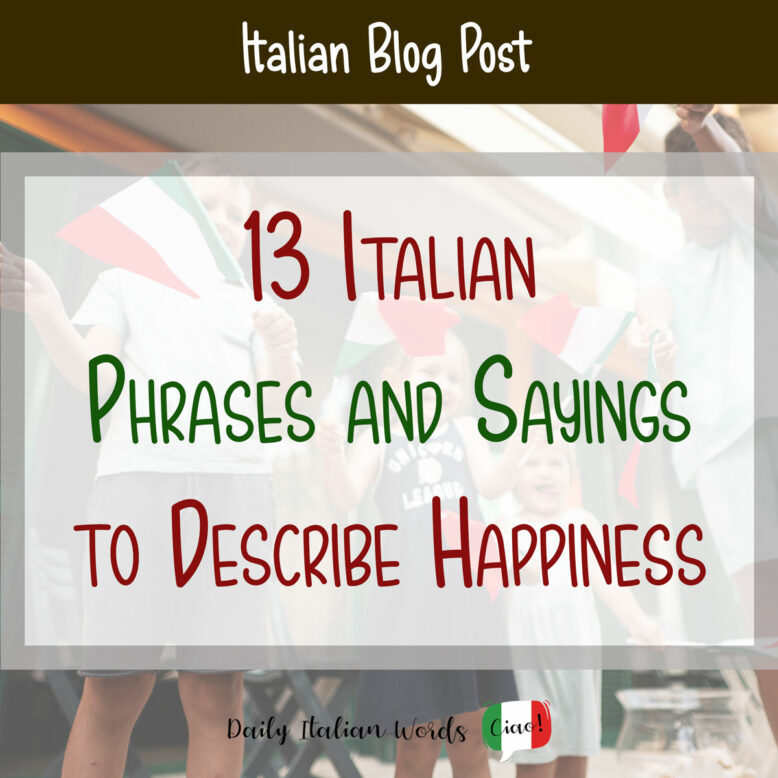While happiness encompasses various definitions and remains profoundly subjective, one thing for sure is that it stands as the most potent emotion, one that truly makes life shine. This is precisely why, during moments of immense joy, having a repertoire of Italian phrases and sayings about happiness becomes invaluable for expressing how happy you are.
In this article, you’ll discover the most popular happiness-packed phrases used in Italian. Whether it’s the infectious exclamation “Sono felice!” or the wise expression “Cuor contento il ciel l’aiuta,” these are the phrases that you need in your Italian happiness vocabulary.

Essere felice
To be happy
Sono felice is the super basic happiness phrase in Italian. It allows you to express your feelings without any fancy twists, just straight up joy! It’s also very easy to use, since it doesn’t change if you are a man or a woman.
Sono così felice di avere un lavoro che mi permette di viaggiare e scoprire nuove culture.
I’m so happy to have a job that allows me to travel and discover new cultures.
Essere contento/a
To be glad
Just like sono felice, the phrase sono contento/a is another simple Italian expression related to happiness. However, the key distinction between them lies in the intensity of the emotion they communicate. Without delving into philosophical intricacies, think of sono felice like blasting fireworks of joy, while sono contento is more like like a cheerful nod of satisfaction. Oh, and it does vary based on gender.
Sono contento che ti sia piaciuto.
I’m glad you liked it.

Essere entusiasta
To be thrilled
We use sono entusiasta to express our eagerness, joy, and positive energy towards a particular situation, idea, or experience. And don’t let the -a ending fool you; despite suggesting a feminine form, this expression remains unchanged regardless of gender.
Maria è sempre entusiasta di partecipare alle lezioni di danza.
Maria is always thrilled to attend her dance classes.
Essere al settimo cielo
To be on cloud nine
This Italian expression is employed to depict a state of profound happiness or euphoria. Settimo cielo, when translated literally into English, means seventh heaven. This concept finds its origins in the Middle Ages when the cosmos was thought to be structured into ascending heavens, culminating in the abode of the Almighty place of God. Among these heavens, only the first seven were within reach for humans. The seventh heaven symbolized the utmost proximity to God and, consequently, the pinnacle of supreme joy.
Quando gli hanno annunciato che la sua canzone era prima in classifica, era davvero al settimo cielo.
He was truly on cloud nine upon learning that his song had reached the top of the charts.
Essere pazzo/a di gioia
To be over the moon
This is yet another phrase commonly employed to capture that feeling of being so ridiculously happy to the point where smiling becomes inevitable. It literally means “to be mad with joy,” aptly depicting the mad rush of happiness bubbling within you.
Sono pazzo di gioia al pensiero che presto potrò di nuovo vedere i miei cari.
I’m over the moon at the thought that soon I’ll be able to see my loved ones again.

Toccare il cielo con un dito
To walk on air
The Italian expression toccare il cielo con un dito translates to touch the sky with a finger in English. We use it to describe a moment of tremendous success, profound joy, or notable accomplishment where we feel as though we are on top of the world and have reached the highest point possible. The sky is often associated with divinity, so when we use this expression it signifies that we have achieved the utmost of what we could desire.
Quando mi ha chiesto di sposarlo, ho provato una gioia così intensa che sembrava di poter toccare il cielo con un dito.
When he asked me to marry him, I felt such intense joy that it seemed like I could walk on air.
Essere felice come una Pasqua
To be as happy as can be
This Italian expression translates to to be happy as Easter and offers another way to convey a sense of immense joy and happiness. You might be curious about why Easter is used instead of Christmas, which is typically thought of as the happiest holiday. Well, Easter is a significant Christian holiday that marks the resurrection of Jesus. Therefore, the phrase essere felici come una Pasqua implies that your happiness is comparable to the feeling of being reborn.
Marco era felice come una Pasqua quando ha ricevuto la notizia della promozione.
Marco couldn’t contain his joy when he got the news of his promotion.
Stare da Dio
To feel great
Here’s another Italian expression that invokes the Divine to describe a state of happiness. The literal translation of stare da Dio is being like God, and it’s like saying that everything is going amazingly well, and we’re experiencing a peak of joy and serenity. This expression is mainly used in casual chats with friends and family, and it also conveys the idea of looking great.
La amo e sto da Dio con lei.
I love her and I feel great with her.

Fare i salti di gioia
To jump for joy
When something wonderful happens, you can also exclaim faccio i salti di gioia, highlighting that you are so joyful that you can’t help but physically jump in celebration!
I bambini hanno fatto i salti di gioia quando hanno scoperto che andremo a Disneyland!
The kids jumped for joy when they found out we’re going to Disneyland!
Camminare a tre metri da terra
To walk on air
Imagine a moment of such pure joy that it feels as if you’re floating above the ground. In Italian, to capture this sensation in a metaphorical way, you would say cammino a tre metri da terra, which translates literally to “to walk three meters above the ground.” For fans of Italian literature and cinema, the romantic tale “Tre metri sopra il cielo” by Federico Moccia, later adapted into a movie by Luca Lucini, has given rise to a similar expression: stare tre metri sopra il cielo (to be three meters above the sky).
Dopo aver superato l’esame che tanto temeva, si sentiva come se stesse camminando a tre metri da terra, con un peso enorme tolto dalle spalle.
After passing the exam he feared so much, he felt like he was walking on air, with a heavy burden lifted off his shoulders.
Non stare nella pelle
To be very excited
Non stare nella pelle is an Italian idiomatic expression used to describe a sense of extreme happiness and excitement about an upcoming event or situation. The literal translation of non stare nella pelle is “not being in one’s own skin,” which metaphorically illustrates the idea that our excitement is so intense that our very skin seems too restrictive to contain it.
Non sto più nella pelle, domani finalmente parto per il Messico!
I can’t contain my excitement, tomorrow I’m finally leaving for Mexico!

Gongolare
To gloat, to be ecstatic
The verb “gongolare” is used in casual conversations to describe a sense of profound happiness and satisfaction for something that boosts one’s vanity and self-esteem or a situation that brings delight. But be careful, as it can also carry a negative connotation if used in contexts where someone is openly enjoying the misfortunes of others.
Dovevi vedere come gongolava quando le hanno detto che sarebbe stata lei la protagonista dello spettacolo.
You should have seen how she was beaming with joy when they informed her that she would be the star of the show.
Cuor contento il ciel l’aiuta
Heaven helps a contented heart
Let’s wrap up this list of top Italian phrases and sayings about happiness, with a delightful saying that invokes celestial benevolence and cosmic blessings: Cuor contento il ciel l’aiuta. This phrase emphasises the idea that by embracing life with a happy and positive attitude, you’re more likely to receive help or blessings from the universe!

Heather Broster is a graduate with honours in linguistics from the University of Western Ontario. She is an aspiring polyglot, proficient in English and Italian, as well as Japanese, Welsh, and French to varying degrees of fluency. Originally from Toronto, Heather has resided in various countries, notably Italy for a period of six years. Her primary focus lies in the fields of language acquisition, education, and bilingual instruction.


